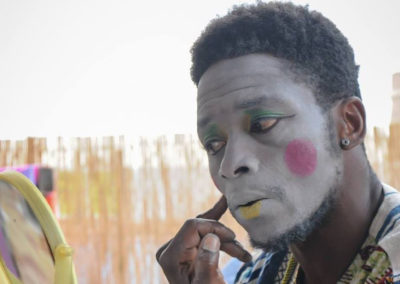
Rootencial is delighted to introduce Primo José Meñan, now also known by his artistic pseudonym Afriquito, who reflects on some of the experiences that have helped define his new passion – theater. His story, full of reflection and inspiration, demonstrates that, despite the challenges and difficulties, it’s never too late to change the course of your life, to create what you want to be to leave a mark.
At the age of 11, Primo José left his country of origin, Equatorial Guinea, to move to Móstoles, Madrid to continue his secondary education. However, a combination of bad friendships and scarce economic resources caused him to perform worse and worse at school, eventually dropping out in the second year of high school.
Immersed in a life of delinquency and on the streets, Primo José says these hard times sparked frustration for the damage he had caused to his family – and eventually led him to discover the world of theater.
I had to drop out of high school because I didn’t even have enough money to buy a blank map; I always had to wait for my friends to finish their homework first, so they could lend me their materials.
At the age of 11, Primo José left his country of origin, Equatorial Guinea, to move to Móstoles, Madrid to continue his secondary education. However, a combination of bad friendships and scarce economic resources caused him to perform worse and worse at school, eventually dropping out in the second year of high school.
Immersed in a life of delinquency and on the streets, Primo José says these hard times sparked frustration for the damage he had caused to his family – and eventually led him to discover the world of theater.
People are creatures of habit; you behave in accordance with the environment around you, or that you have created for yourself. If at some point you want to change a habit in your life, you have to get out of that environment.
Primo José says that he has faced a number of challenges during his training and subsequent career in the theater. Performing for a Western theatrical audience, without the opportunity to strengthen the African representation of his own society of origin, is something that he initially struggled to be comfortable with.
Fortunately, in the past two years, Primo José discovered the French technique Lecoq, through which, using of a more corporal acting method, he discovered his flair for self-direction, giving him the possibility to define his own role and character on the stage, and not just to be an actor waiting to receive instruction from a script.
On occasion, Primo José has not been proud of the roles he has played on stage because of the demeaning way that black characters are represented; he has played a trader in pirated goods, a drug dealer, and an immigrant street trader. While he feels that this is slowly changing and that black actors are starting to be cast to more positive roles on stage – as lawyers, businessmen, or professors, for example – these cases are the exception, and the same challenges largely persist.
Frustrated, Primo José decided to stop attending castings in Spain and is now focusing on opportunities in other European countries such as Germany.
On occasion, Primo José has not been proud of the roles he has played on stage because of the demeaning way that black characters are represented; he has played a trader in pirated goods, a drug dealer, and an immigrant street trader. While he feels that this is slowly changing and that black actors are starting to be cast to more positive roles on stage – as lawyers, businessmen, or professors, for example – these cases are the exception, and the same challenges largely persist.
Frustrated, Primo José decided to stop attending castings in Spain and is now focusing on opportunities in other European countries such as Germany.
Whenever I went to a casting, they would make me play a black newcomer on a boat, or a waiter who doesn’t speak Spanish, like the Machupichu character from the ‘Aida’ TV series.
Aware of the impact that disparaging images can have on how his culture and origin are represented in society, he is determined to no longer feed stereotypes and negative prejudices about the African community, warning that this is not the best way to make the most of the skills and abilities of a person ‘of race.’ These stereotypes and prejudices damage and reduce opportunities for the black population, impacting children and young people most of all.
Elaborating on this point, he recognizes that his socio-cultural identity and ‘race’ has closed doors in his career and prevented him from playing some roles on the stage, due to the negative stereotypes that persist in the world of Spanish theater. At the same time, he emphasizes that his identity has allowed him to differentiate himself and create new artistic styles in Spain. In fact, Afriquito, his fictitious clown character, is receiving significant attention; he’s proud to have received offers from many different countries, even from Bolivia.
Proud of his projects and the challenges he has faced and overcome, he defends the idea that every African who has lived abroad and learned new positive things must share them with his or her community. It’s essential, he says, to never forget that by leveraging those roots, that environment and society, you can offer something unique and different.
Sharing and leaving a legacy is important since we will all leave this world one day. The only important thing is what we will leave to the next generations.
Through Afriquito, Primo José hopes to create cartoons reflecting the situation of the black population residing outside the African continent after the abolition of slavery. Aware of the significant work that this will entail, he stresses that in order to be successful, you must be consistent and constant and remember that “we must be clear that one’s greatest enemy is oneself”.

Comments are closed.